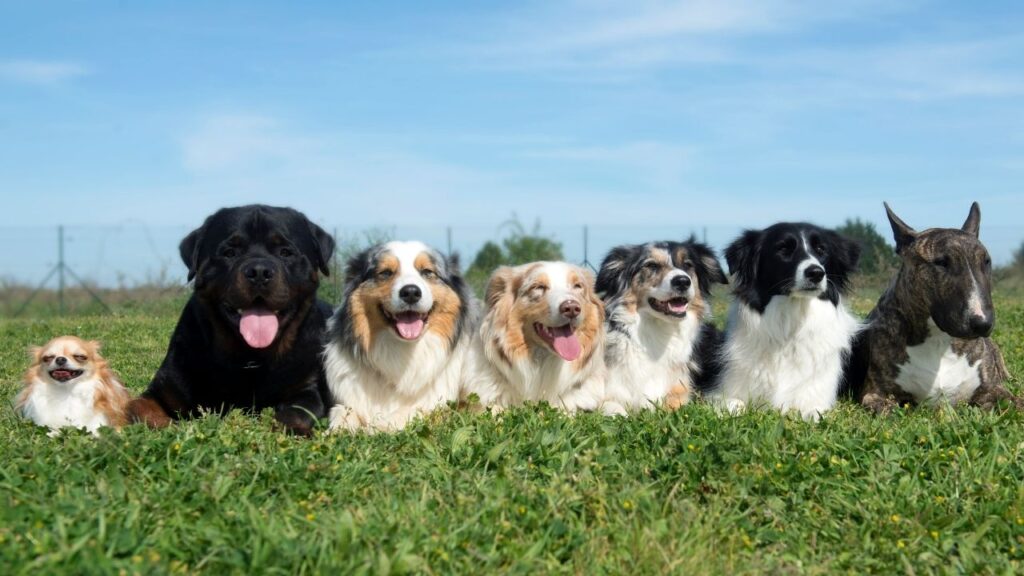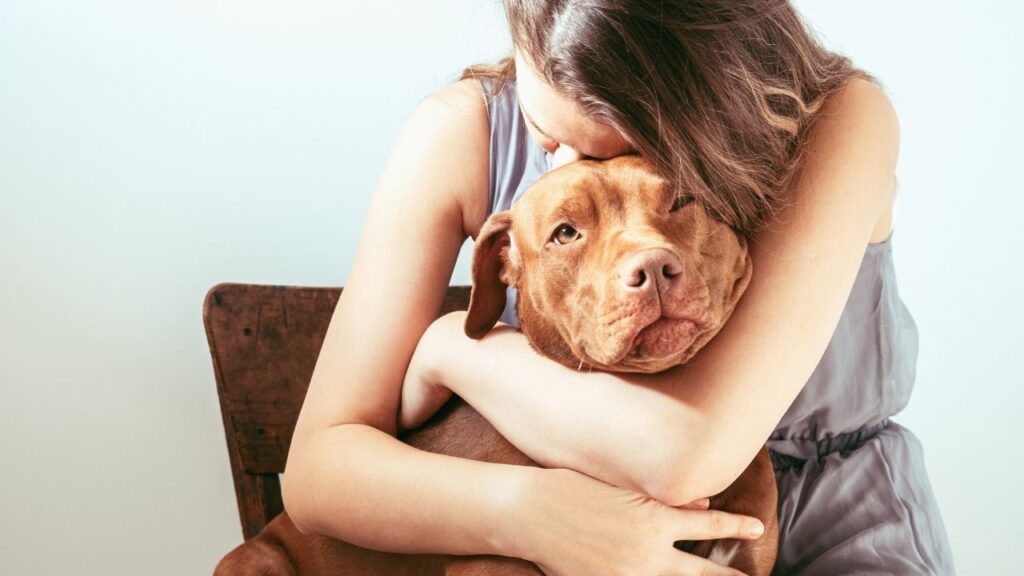If you feel like your pets are family, you aren’t alone. And science is beginning to show you’re right to feel this way.
Key Takeaways
- Dogs are considered family because they act as support, are companions, perform actual jobs to help people or the community, and provide protection. The many roles they play have similar qualities to some family members, so many people view them this way.
- Some people consider dogs to be family. For others, they play a valuable role but may be viewed differently depending on culture, bond, etc.
- Studies have shown that dogs think we are family, and their relationships with us bear a remarkable resemblance to the parent-infant attachment bond.
- It is difficult to say for sure if dogs really love their owners, but we certainly believe it. It is clear that dogs modify their behavior to bond with humans and gain trust and relationships. They also show selective bonding, which may be interpreted as a type of love to many people.
The Human-Animal Bond
The human-animal bond is extremely strong, and dogs play a critical role in human individual and community health. Pets are family: 95% of pet owners consider their pet a part of the family and 98% of pet owners report at least one specific health benefit from their pet.1
Additionally, new research suggests dogs likely play a beneficial role in social and emotional development in children.2
Humans and animals share a known mutually beneficial relationship called the human-animal bond that research is beginning to dive into deeply.
Scientific research has documented several benefits that people get out of the human-animal bond:1
- decreased blood pressure
- reduced anxiety
- enhanced feelings of well-being
And according to a study by Bayer, people living with dogs are 15% less likely to die from heart disease.3
In exchange, humans provide basic needs such as food, shelter, water, well-being, and companionship to pets.
Were Pets Always Family?
The human-animal bond has changed, developed, and evolved over more than 15,000 years. The initial interconnection was based on a working relationship in which animals provided specific day-to-day services and protection from threats. In times of war, some also were documented to provide emotional support in addition to their role as protectors and mascots.3
The role of pets has broadened extensively over time to include many different positions as workers and companions. The connection humans have to their animals is intense and rooted deeply in history. As human roles have changed, so too have the roles of pets and how humans rely on, relate to, and depend on them on so many levels.
Veterinarians Often See Pets as Family
We have all seen amazing stories about how the bond between a human and a dog can have amazing results. Veterinarians are privileged to hear stories every day about how pets are family members.
- Dogs who alert their families to fire and get everyone out of the house safely.
- Humans who choose to remain homeless because they didn’t want to leave their dog behind to move into a shelter.
- Dogs who identify cancer and blood sugar changes in their chosen people or even in strangers.
While not every dog-human pair has to include heroics, we still feel the impact of that bond every day. As veterinary professionals, we get to see snapshots of the love shared between our patients and their people:
- A dog who stands between the vet and “his” human baby.
- A human calling in favors to pay for unexpected vet care.
- A dog relaxing and allowing us to help them because their person said everything was OK.
- A dog that refuses to eat until her person comes to visit.
- A human choosing euthanasia to spare their dog from continued suffering.
Your Dog’s Place in Your Family
Today, dogs play many roles in human lives and family dynamics. They maintain their important place as workers although their possible roles have dramatically expanded in this area.
While dogs still provide function as protectors and workers in an agricultural sense for many people around the world, they also act as:
- Emotional support animals
- Therapy animals
- Transportation
- Hunting
- Searching
- Service animals that perform specific tasks for their owners
They can also be used to identify things through smell that humans are unable to detect on their own. This applies to medical conditions, tracking missing or wanted people, and searching for and identifying drugs and explosives.
For many, the household dog does not perform any specified working role. However, research shows without question the benefit that humans gain from this bond.
How Dogs Affect Us
Human-animal interactions have been shown not only to impact blood pressure and anxiety, but also to modulate heart rate and specific hormones that relate to feelings of wellbeing.
Interactions with animals have been shown to increase oxytocin, which is associated with bonding, socialization, and stress relief. These interactions have also been associated with decreased cortisol levels in both humans and dogs. This is a hormone related to the stress response.
Some researchers also suggest that the presence of an animal stimulates the brain to act in a kind of “care mode” and this mindset induces people to take care of themselves as well.1
How Dogs Affect Children
While the general role in humans’ emotional wellbeing has long been known, recent research in the dogs’ role in childhood development is quite novel and suggests that active play and walking with the family dog may be associated with better social-emotional development in young children.
According to research published in Nature, children from dog-owning households had a reduced likelihood of conduct problems and peer problems, and an increased likelihood of prosocial behavior when compared with children without a dog.2
So … Are Dogs Family?
For many of us, dogs are family. And science is backing that up. One study reads, “Cumulating evidence suggests that the relationship between companion dogs and their human caregivers bears a remarkable resemblance to the parent-infant attachment bond.”4
Dogs can read human facial expressions and are extremely effective at following gaze to facilitate choosing items and completing tasks. This is remarkably similar to the way infants respond to their caregivers and dogs use this social information to improve bonding.
In a way, this can be considered similar to a family member or friend. As the study says, “Dogs seem to observe humans closely, form behavioral rules from this and apply them to new contexts.”4
Also, it is critical to understand that not all people interact with dogs in the same way and that not all dogs are truly companion animals. However, for those dogs that do play this role at home, “Dogs pay more attention to the actions of their caregivers than to the actions of other familiar humans.”4
Household companion dogs selectively bond closely to humans, attend to their needs, and sometimes make sacrifices for their caregivers. Both data and many people’s human experience suggest that there are similarities between family relationships and those held between human and dog.
Pets Are Not Family for Everyone!
While this evidence is compelling, it is also important not to overinterpret and to recognize that not all dogs see people in this way and not all people see dogs in this way.
Humans have a tendency to humanize or anthropomorphize dogs due to our long history and relationship with them and much more research needs to be done to truly identify what dogs are capable of and how they see humans.
Understanding Other Opinions About Pets as Family
It is perfectly OK to feel that your dog is your family. We all choose relationships in our lives and surround ourselves with beings who make us feel safe and happy.
It is also OK for other people to feel dogs should not be family. Different cultures have different beliefs and customs regarding dogs, and there are many ways that people approach their relationships with their dogs.
Love and caring come in many forms. A dog who lives in a cozy doghouse and goes hunting every week can be just as dearly loved as a dog who sleeps with his people in bed and goes to doggie daycare.
Not a Dog Person? Doesn’t Mean You’re a Bad Person
There are also people who just aren’t dog people. And that is OK! We all have different things that we care about or are not interested in.
Respect that other people may define “family” differently from how you do, just as you hope they respect your definition of family.
It Is Okay to Grieve Your Dog
Many people worry about how intense their grief is when their dog dies. For some, it’s nearly as big a loss as the loss of a parent or other close family member. But we don’t think that is odd in the veterinary profession.
Given the extensive roles that dogs play and the deep connection that these roles have led to, losing a pet can mean feeling loss of a deep connection and companionship. This in itself is like losing a family member.
In the context of losing someone with whom you have a bond, shared experiences, and whom you have dedicated extensive time to care for, grief could not be more normal. You are not alone in this feeling.
- The Human Animal Bond Research Institute. HABRI. https://habri.org/. Published March 5, 2020. Accessed February 7, 2023.
- Wenden EJ, Lester L, Zubrick SR, Ng M, Christian HE. The relationship between dog ownership, dog play, Family Dog Walking, and pre-schooler social–emotional development: Findings from the PLAYCE Observational Study. Nature: Pediatric Research. 2020;89(4):1013-1019. doi:10.1038/s41390-020-1007-2
- The human-animal bond throughout time. The College of Veterinary Medicine at Michigan State University. https://cvm.msu.edu/news/perspectives-magazine/perspectives-fall-2018/the-human-animal-bond-throughout-time. Published December 7, 2018. Accessed February 7, 2023.
- Benz-Schwarzburg J, Monsó S, Huber L. How dogs perceive humans and how humans should treat their pet dogs: Linking cognition with ethics. Frontiers in Psychology. 2020;11. doi:10.3389/fpsyg.2020.584037
Topics
Did You Find This Helpful? Share It with Your Pack!
Use the buttons to share what you learned on social media, download a PDF, print this out, or email it to your veterinarian.



